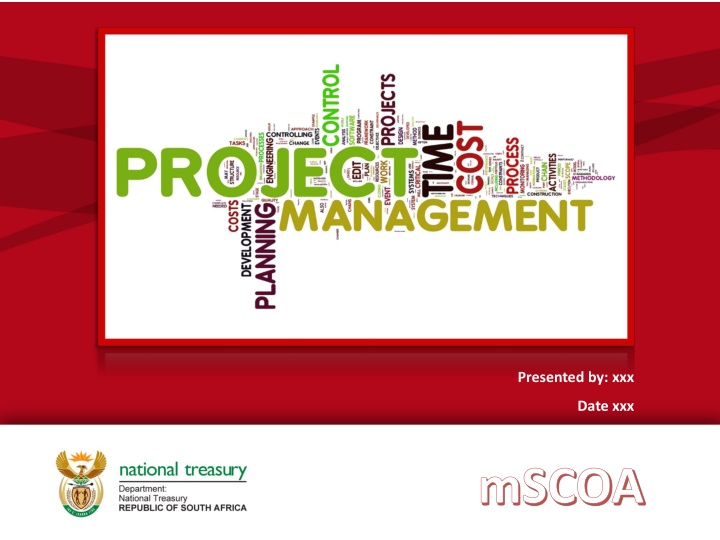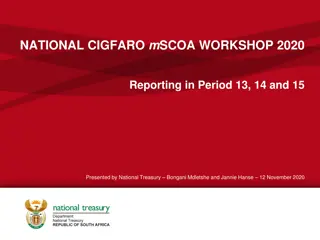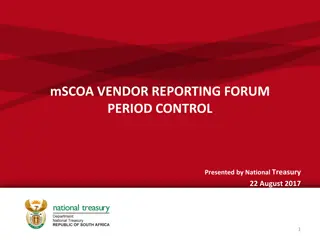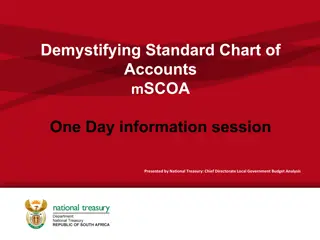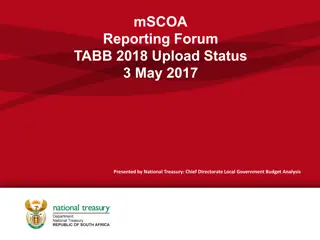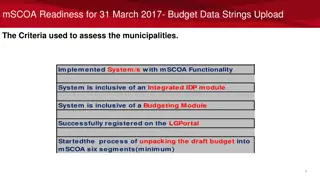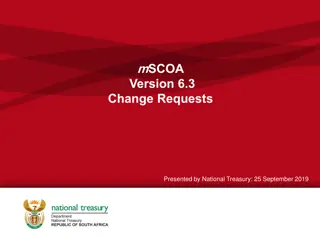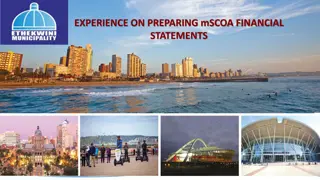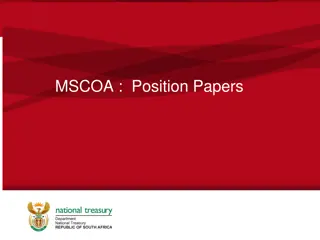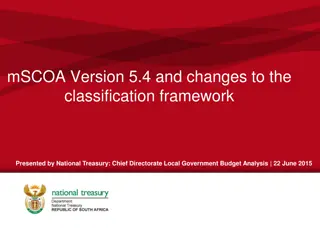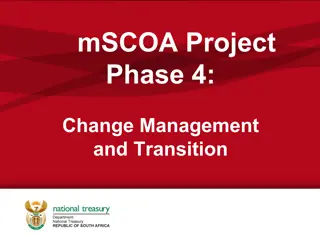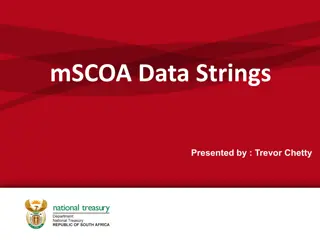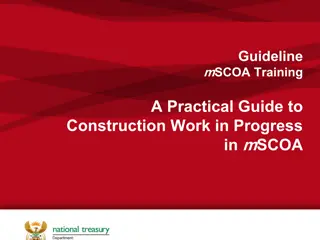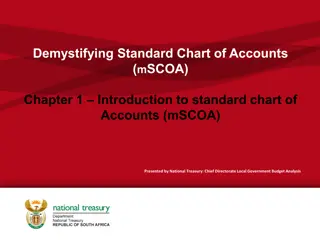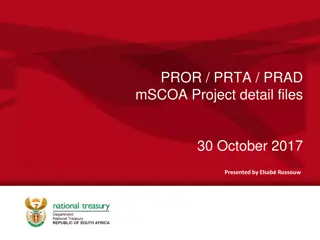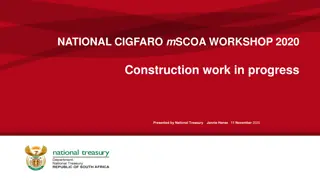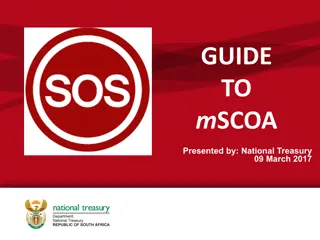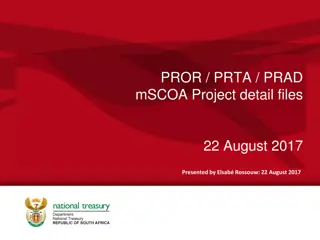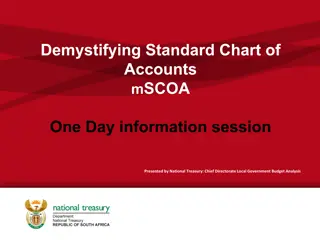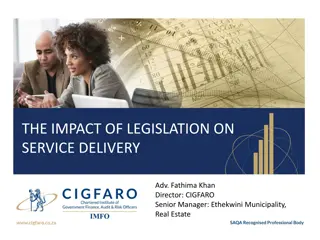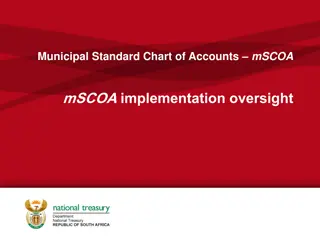mSCOA
This overview delves into key terms, project life cycle phases, and the essence of project management. Understanding what a project is, its stakeholders, and the role of a project manager are highlighted, along with the importance of actively managing projects to achieve desired outcomes successfully.
Download Presentation

Please find below an Image/Link to download the presentation.
The content on the website is provided AS IS for your information and personal use only. It may not be sold, licensed, or shared on other websites without obtaining consent from the author.If you encounter any issues during the download, it is possible that the publisher has removed the file from their server.
You are allowed to download the files provided on this website for personal or commercial use, subject to the condition that they are used lawfully. All files are the property of their respective owners.
The content on the website is provided AS IS for your information and personal use only. It may not be sold, licensed, or shared on other websites without obtaining consent from the author.
E N D
Presentation Transcript
mSCOA PROJECT MANAGENT Presented by: xxx Date xxx mSCOA
AGENDA Key terms Project Life Cycle Initiation the project Defining the project Defining the plan Implementation Closure Success vs Failure
AGENDA Key terms Project Life Cycle Initiation the project Defining the project Defining the plan Implementation Closure Success vs Failure
KEY TERMS What is a project What is project management Project stakeholders Project management skills Project manager A good project manager
WHAT IS A PROJECT? A project is a temporary work effort with a specific beginning and end date and which has a unique, clearly defined, and measurable outcome
WHAT IS A PROJECT? A project is a problem scheduled for solution A problem is a gap (achieving your objective) between where you are and where you want to be, with an obstacle that prevents easy movement to close the gap Where we are: Currently inconsistent, inaccurate reporting across municipalities Where we want to be: consistent, accurate, comparable information across municipalities hence mSCOA The gap: moving from conventional reporting and budgeting to the 7 segments defined by mSCOA
WHAT IS A PROJECT? To manage the breadth or range of a project, active and proactive project management is required throughout the duration of the project. It cannot be simply initiated and/or planned and left alone
WHAT IS PROJECT MANAGEMENT? Project management is the planning, scheduling, and controlling of project activities to meet project objectives Project management is a set of tools, skills, techniques, and knowledge that enable you to successfully complete a project (achieve desired results) on time and at or under budget
PROJECT MANAGEMENT IS A roadmap for addressing critical questions A method for measuring results A means for identifying and addressing problems A formal mechanism for managing change A means for results A mechanism for evaluating the process A vehicle for communicating project activities to others
A PROJECT MANAGEMENT SYSTEM In order to manage projects successfully, it is necessary to have a system A full project management system consists of components If any one of the seven components is not in place or does not function satisfactorily, then you will have some difficulty managing projects
THE SEVEN COMPNENTS Human Factors Method Culture Organization Planning Information Control
UNPACKING THE 7 COMPONENTS Human Factors A project manager must be able to deal effectively with all of the parts of this component in order to be successful Leadership Negotiation Team building Motivation Communication Decision making
UNPACKING THE 7 COMPONENTS Human Factors continued The Right People The Right Type of Management One of the key ingredients is having the right people on the job and managing them appropriately
UNPACKING THE 7 COMPONENTS Methods refer to the tools of your trade The culture of an organization affects everything you do Organisation: every organisation must deal with the assignment and definition of each person s authority, responsibility, and accountability Planning: every organisation needs a good methodology for planning projects if it is to be successful Information: good historical data is needed for planning projects (in this case information from Piloting municipalities) Control: The control component is supported by the planning and information components
PROJECT STAKEHOLDERS Customer (service provider) End User (PT, NT) Project Sponsor Project Leader Team Members Resource Managers
PROJECT MANAGEMENT SKILLS General Business Management (consistently producing results expected by stakeholders) Leading (establishing direction, aligning resources, motivating) Communicating (clear, unambiguous, and complete) Negotiating (conferring with others to reach an agreement) Problem Solving (definition and decision making) Distinguish causes and symptoms Identify viable solutions Influencing Organisation (understanding power and politics)
PROJECT MANAGER A project manager is a person who causes things to happen Key responsibility of the project manager is to successfully accomplish the project objectives by balancing the competing demands for quality, scope, time, and cost
A GOOD PROJECT MANAGER Takes ownership of the whole project Is proactive not reactive Adequately plans the project Is authoritative (NOT authoritarian) Is decisive Is a good communicator Manages by data and facts not uniformed optimism Leads by example Has sound Judgement Is a motivator Is diplomatic Can delegate
AGENDA Key terms Project Life Cycle Initiation the project Defining the project Defining the plan Implementation Closure Success vs Failure
BASIC PROJECT MANAGEMENT CYCLE Planning Initiating Closing Controlling Executing IMPLEMENTATION
THE VALUE OF PROJECT MANAGEMENT For most smaller projects, the real value of Project Management is in Initiating, Planning & Closing These areas are where projects go from success failure/ dissatisfaction
WHY IS IT IMPORTANT? Initiating is where you formulate your contract with the client/customer /users/management Lack of agreement about what s important is the biggest cause for disagreement Lack of understanding of the impact of changes is the biggest reason for escalating costs (in cost, time and quality terms)
INITIATION PROJECT OBJECTIVE The most powerful tool for initiation is a very simple statement of the objective of the project: To In a way that Strategy WHAT you are going to do Tactics HOW you are going to do it, including parameters So that Objective/Goal WHY - Measurable business benefit.
DESCRIBE THE PROBLEM Takes the original project proposal and define it more precisely What does the business unit project sponsor envision as a desired outcome? Who are the key stakeholders who are driving this project? How will the end user benefit from this project?
IDENTIFY PROJECT RESOURCES Identify skills/knowledge required to move the project forward Identify the resource area from whence these skills/knowledge will be obtained Estimate % time required for the project
KEY POINTS - PROJECT MANAGEMENT Create a project plan Be clear of scope and objectives Establish clear statement of what is to be done Establish risks to be managed Establish costs and durations Establish resources required
PLANNING The point of Planning is NOT to follow the plan, but to gain a better understanding of what needs to be done In preparing for battle, I have always found that plans are useless, but planning is indispensable Eisenhower The other purpose of a plan is for communication your stakeholders care about whether you are on- track/late/etc.
CORE PLANNING Scope Planning written statement Scope Definition subdividing major deliverables into more manageable units Activity Definition determine specific tasks needed to produce project deliverables Activity Sequencing plotting dependencies Activity Duration Estimating determine amount of work needed to complete the activities Schedule Development analyze activity sequences, duration, and resource requirements Resource Planning identify what and how many resources are needed to perform the activities Cost Budgeting develop resource and total project costs Project Plan Development taking results from other planning processes into a collective document
CORE PLANNING CONTINUED Quality Planning standards that are relevant to the project and determining how to meet standards Organizational Planning identify, document, and assigning project roles and responsibilities Communications Planning determining rules and reporting methods to stakeholders Risk Identification determining what is likely to affect the project and documenting these risks Risk Quantification evaluating risks and interactions to access the possible project outcomes Risk Response Development defining enhancement steps and change control measures Procurement Planning determining what to buy and when Solicitation Planning documenting product requirements and identifying possible sources
O r d e r o f e v e n t s Scope Statement Create Project Team Project Plan Finalize the team Estimate Time and Cost Critical Path Schedule Budget Procurement Plan Quality Plan Risk Identification, quantification and response development Change Control Plan Communication Plan Management Plan Final Project Plan Project Plan Approval Kick off
PLANNING - EXPLORING SYSTEM IMPLECATIONS HR Training and development IT infrastructure Core mission/vision Other
WHAT IS A PROJECT MANAGEMENT PLAN? A project management plan is a fundamental tool for the project manger to deliver the project successfully. This document is a strategic and formalized roadmap to accomplish the project s objectives by describing how the project is to be executed, monitored and controlled, which includes creating a project work breakdown structure, identifying and planning to mitigate risk, identifying manners in which to effectively communicate with stakeholders and other project team members, and developing a plan to manage changes.
WHAT IS A PROJECT MANAGEMENT PLAN? It is essentially a guide for executing the project, and a manner in which to gain buy-in and approval from stakeholders and sponsors prior to commencement. This plan is a living document that is updated and revised throughout the project at strategic milestones or significant events to accommodate the progressive, elaborative nature of the project. The project management plan will vary based on size, complexity, risk, and/or sensitivity of the project. Implementing the project management plan requires competency in all of the project management knowledge areas and is critical to the success of the project.
PLANNING Quite often, when planning, you DON T need a detailed task list in a chart You can trust people in your team to work out how to deliver their parts All you need to do a plan and schedule for is to Identify what needs to be done Identify who needs to do it Identify when things need to be done Track progress
PLANNING TRACKING PROGRESS The solution is not to plan tasks and not to measure progress in % complete Instead, only plan milestones just plan them small enough that it gives you visibility of progress
RISK MANAGEMENT Project risk is an uncertain event or condition that, if it occurs, has a positive or negative effect on a project objective Threat Scope Poor Quality Product Threat Schedule Late Delivery Threat Cost Overspend In addition there are a multitude of threats that must be managed
RISK MANAGEMENT PROCESS Identify risks Assess likelihood and impact Rank risks and prioritise Define risk management approach & actions Implement actions Monitor & review
MONOTORING/CONTROLLING/ EXECUTING bicycle scooter Scope Quality Rolls%20Royce Project%2520Plan Resource Time clock-round-wall
MONOTORING Unless progress is monitored, you cannot be sure you will succeed
CONTROLLING/EXCECUTING SCOPE MANAGEMENT You can t stop the stakeholders changing their minds, or requirements changing You CAN make them aware of the impact Let the stakeholder prioritise show them the cost of making the scope change
CONTROLLING PROCESS Controlling Processes needed to regularly measure project performance and to adjust project plan What are you expected to do as a manager? If a deviation from the plan is discovered, you must ask what must be done to get back on track, or if that seems impossible how the plan should be modified to reflect new realities.
EXECUTING PROCESS Project Plan Execution performing the activities Complete Tasks/Work Packages Information Distribution Scope Verification acceptance of project scope Quality Assurance evaluating overall project performance on a regular basis; meeting standards Team Development developing team and individual skill sets to enhance the project Progress Meetings Information Distribution making project information available in a timely manner Solicitation obtaining quotes, bids, proposals as appropriate (in this case use the transversal contract) Source Selection deciding on appropriate suppliers Contract Administration managing vendor relationships
